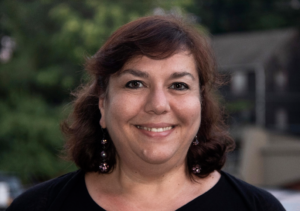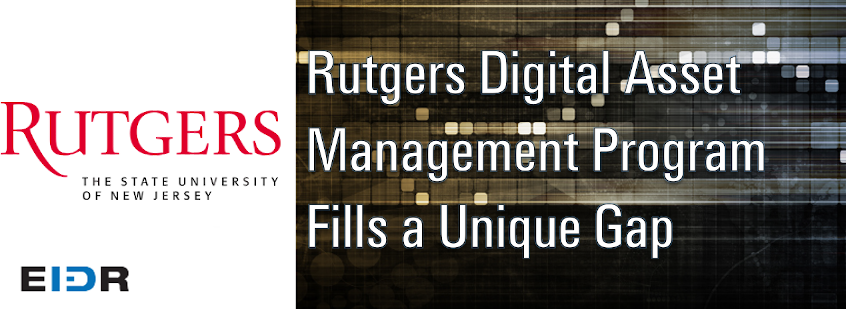By Chris Tribbey, Editorial Director, MESA
As a graduate student at Rutgers, working toward her masters in library and information science (MILS), Yonah Levenson, manager of metadata strategy for WarnerMedia and chair of the Language Metadata Table initiative struck up a conversation with one of her professors, Lilia Pavlovsky, director of the Master of Information program at the Rutgers School of Communication and Information.
“We began talking about the world of business information professionals that are out there,” Levenson said. “And it became very clear there was a gap in the digital asset management education space. We saw an opportunity to fill that gap.”
Thus was born the online, non-credit professional education certificate Digital Asset Management (DAM) program from Rutgers, with Levenson and David Lipsey, a well-known DAM specialist, working with Pavlovsky to get the initial six-course offering off the ground in September.
“It’s the first real program dedicated to graduate-level, professional education for digital asset management,” said Lipsey, who teaches the online courses — offering an enterprise-level perspective of DAM — with Levenson and two others. “It covers everything from the fundamentals and metadata to creative operations and integration, including an advanced class on implementation.
“We’re different from other programs, and it’s a professional certificate aimed at working asset management professionals, no matter what sector, broadcast, museums, libraries, sports, television, consumer packaged goods. For some reason were popular with wineries!”
 Like so many others in the DAM space today, Levenson knows how crucial the practice has become to not only media and entertainment, but many industries.
Like so many others in the DAM space today, Levenson knows how crucial the practice has become to not only media and entertainment, but many industries.
And she’s also long lamented just how specialized DAM can be, and how hard it is to find education around the ins and outs of data governance, how to create metrics and measurement for DAM systems, and how DAM interacts with other systems within an organization.
“It’s the first DAM certificate in North American, filing this gap for professionals working in digital asset management,” she said. “From a career perspective working in DAM, a lot of people are sole practitioners. There are so many DAM professionals who want more formal education and better insight into accomplishing their work roles with excellence.”
 So the feedback following the initial courses of the Rutgers DAM program was everything her and Lipsey were hoping for, and more.
So the feedback following the initial courses of the Rutgers DAM program was everything her and Lipsey were hoping for, and more.
“The feedback has been so surprising, from the firsts who finished the first six classes,” Lipsey said. “Many had MILS degrees, but wanted to work in digital asset management. We got lot of compliments that this was exactly what they needed to accommodate their MILS background, but wanted to be in professional DAM.”
Levenson also sees an opportunity in light of the ongoing novel coronavirus pandemic: conferences are canceled, travel budgets are freed up and everyone’s working remotely.
Online professional development courses like Rutgers’ DAM fits the bill for companies looking to give their specialized employees a leg up.
“In this time where so many people are working from home, we want to encourage people to do professional development,” she said. “I was hoping to be at NAB in April like everyone else, and with no travel, how do we build community? We’re a great example of how you can make use of extra time you may have now, if you’ve ever been interested in DAM, to expand your knowledge.”
New classes in the DAM course began this week, and Levenson and Lipsey are already looking at ways to improve the curriculum.
“We’ll have a couple webinars that discuss a day in the life of a digital asset management professional, and we’ll do some further things along the lines of intensive and special studies,” Lipsey said. “We’re doing a lot of careful listening to get feedback. We were right near capacity for the initial set of classes, so I think Yonah and I are most looking at who we need to bring on to help teach.”
For more information about the Rutgers DAM program, click here.

